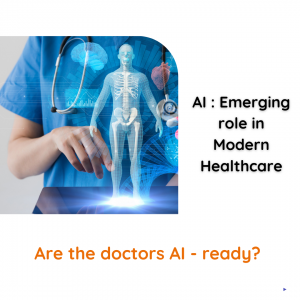 Artificial intelligence (AI) has been a game-changer in the healthcare industry from the moment it was introduced, predicting healthcare trends and transforming technologies to diagnosis and treatment.AI brings cost savings within healthcare operations and delivery, which is one of the most primary and major drivers for the implementation of AI applications in healthcare
Artificial intelligence (AI) has been a game-changer in the healthcare industry from the moment it was introduced, predicting healthcare trends and transforming technologies to diagnosis and treatment.AI brings cost savings within healthcare operations and delivery, which is one of the most primary and major drivers for the implementation of AI applications in healthcare
The way AI is emerging in modern healthcare today is a total game-changer:
1. Radiology: Presently, AI solutions are being developed to automate image analysis and diagnosis. This will highlight the areas of the scan, provide efficiency and reduce human error. The upcoming opportunity for fully automated solutions can read and interpret a scan without human oversight; this will enhance instant interpretation in under-served geographies or even after hours. The improved demonstrations in AI are also illustrating the progress towards new opportunities for cancer prevention and tumor detection on MRIs and CTs.
2. Drug discovery: More enhancements and developments in AI solutions will help identify new potential therapies from vast databases of information on existing medicines, which could be redesigned to target critical threats of various grounded and existing viruses.
3. Patient risk identification: With the study of vast amounts of historic patient data, AI solutions can provide real-time support to clinicians to help identify at-risk patients. Patient’s electronic health records will present solutions to any highlighted patient risks. Also, recent work in AI has demonstrated the ability to predict the risk of cardiovascular diseases based purely on a still image of a patient’s retina.
4. Surgical Robots: They are proving to be a superpower provided to surgeons which helps in improving the quality and accuracy of the surgery. The robots help the surgeons to see, create precise and minimally invasive incisions, stitch wounds
The coming years will surely bring the best opportunities for hybrid models, where clinicians are supported in diagnosis, treatment planning, and identifying risk factors, which retain ultimate responsibility for the patient’s care. This will result in faster adoption by healthcare providers by mitigating perceived risk and start to deliver measurable improvements in patient outcomes and operational efficiency at scale.
Are you ready for AI-based solutions in the healthcare system? comment your suggestions

